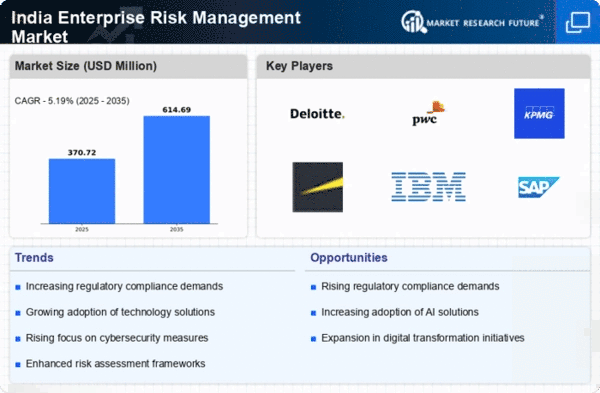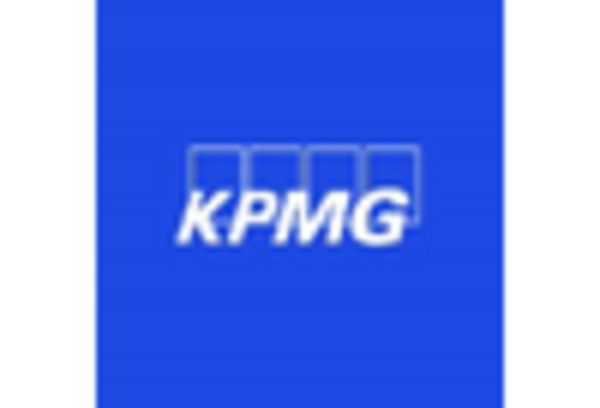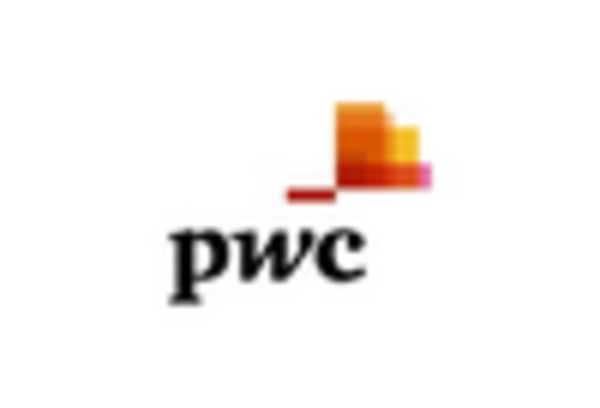Focus on Cybersecurity Risks
The rising threat of cyberattacks is a significant driver of the enterprise risk-management market in India. As organizations increasingly rely on digital platforms, the potential for cyber risks has escalated, prompting businesses to prioritize cybersecurity within their risk management strategies. The enterprise risk-management market is adapting to this need by offering specialized solutions that address cybersecurity threats. According to industry reports, the cybersecurity market in India is projected to reach $3 billion by 2025, indicating a growing recognition of the importance of safeguarding digital assets. This focus on cybersecurity is likely to drive demand for integrated risk management solutions that encompass both traditional and cyber risks, thereby enhancing overall organizational resilience.
Increased Regulatory Scrutiny
The enterprise risk-management market in India is experiencing growth due to increased regulatory scrutiny across various sectors. Regulatory bodies are imposing stricter compliance requirements, compelling organizations to adopt robust risk management frameworks. This trend is particularly pronounced in the financial services sector, where regulations such as the Reserve Bank of India's guidelines necessitate comprehensive risk assessments. As organizations strive to meet these regulatory demands, the enterprise risk-management market is likely to benefit from heightened investments in compliance solutions. It is estimated that compliance-related expenditures could account for up to 30% of total risk management budgets in the coming years. This shift underscores the critical role of effective risk management in ensuring compliance and maintaining operational integrity.
Growing Awareness of Risk Management
The increasing awareness of risk management among organizations in India is driving the enterprise risk-management market. Companies are recognizing the importance of identifying, assessing, and mitigating risks to ensure business continuity and sustainability. This awareness is reflected in the rising investments in risk management solutions, which are projected to reach approximately $1.5 billion by 2026. As organizations strive to enhance their risk management frameworks, the demand for comprehensive enterprise risk-management market solutions is likely to grow. This trend is particularly evident in sectors such as finance, healthcare, and manufacturing, where the potential impact of risks can be substantial. Consequently, the enterprise risk-management market is expected to expand as businesses prioritize risk management as a critical component of their strategic planning.
Emphasis on Sustainable Business Practices
The enterprise risk-management market is influenced by the increasing emphasis on sustainable business practices in India. Organizations are recognizing that sustainability is not only a moral imperative but also a critical component of risk management. By integrating environmental, social, and governance (ESG) factors into their risk management frameworks, companies can better anticipate and mitigate risks associated with sustainability challenges. This trend is reflected in the growing number of businesses adopting ESG reporting standards, which is expected to rise by 40% by 2026. As organizations align their risk management strategies with sustainability goals, the enterprise risk-management market is likely to see a corresponding increase in demand for solutions that facilitate this integration.
Technological Advancements in Risk Assessment
Technological advancements are significantly influencing the enterprise risk-management market in India. The integration of artificial intelligence (AI), machine learning (ML), and big data analytics into risk assessment processes is enhancing the ability of organizations to identify and mitigate risks effectively. These technologies enable real-time monitoring and predictive analytics, allowing businesses to respond proactively to potential threats. As a result, the enterprise risk-management market is witnessing a surge in demand for innovative solutions that leverage these technologies. According to estimates, the market for AI-driven risk management solutions is expected to grow at a CAGR of over 20% through 2025. This trend indicates a shift towards more sophisticated risk management practices, positioning organizations to better navigate the complexities of the modern business environment.
















